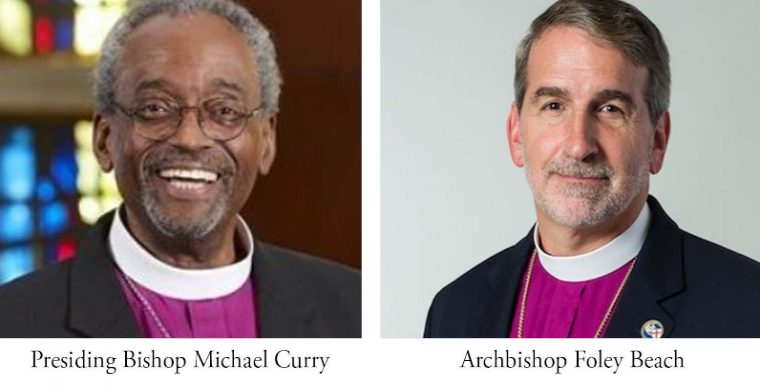ANGLICANS AND EPISCOPALIANS AT ODDS OVER ROE V WADE SCOTUS DECISION
David W. Virtue, DD
www.virtueonline.org
June 25, 2022
A decision by the Supreme Court to overturn Roe v Wade saw two North American Anglican jurisdictions at polar extremes on the issue.
Within 30 minutes of the long-anticipated decision, Episcopal Presiding Bishop Michael Curry intoned that he was deeply grieved by it. "We as a church have tried carefully to be responsive both to the moral value of women having the right to determine their healthcare choices as well as the moral value of all life. Today's decision institutionalizes inequality because women with access to resources will be able to exercise their moral judgment in ways that women without the same resources will not."
The Episcopal Church's senior leader went on to say that, "As Episcopalians, we pray for those who may be harmed by this decision, especially for women and other people who need these reproductive services."
The Episcopal Public Policy Network immediately waded in, sending an e-mail action alert urging Episcopalians to advocate for Congressional action "to provide a right to abortion care in federal statute."
A number of episcopal clergy and lay leaders stepped up to the plate and offered up a Service of Lament and Healing liturgy as a way for the church-at-large to respond to an anticipated overturn of Roe v. Wade as a pastoral response "to those who will be affected by the overturn of this historic precedent."
There is something profoundly ironic in the use of the word 'lament.' The Bible records several reasons why people lament. We lament when we grieve over the loss of someone or something dear to us (Luke 8:52). Grief is a common human experience, and Jesus entered into that grief with us when He was on the earth. When Lazarus died, his sisters Mary and Martha grieved, and their friends lamented over this loss (John 11:17--37). Jesus' heart was touched to such an extent that He wept with them (John 11:35).
The Episcopal Church does not want any lamentation over the loss of a "pre-born" mass of cells being extracted from its mother's womb, and not the life that might have been, the exact opposite of what Scripture teaches. As TEC has embraced the culture of death with the "death" of procreation in homosexual activity, it is completely consistent that it should once again attempt to overturn what scripture clearly teaches about life now and in the life to come.
By contrast, Anglican Church in North America Archbishop Foley Beach took a decisive stand that recognized the evil of abortion while advocating helping mothers to retain the child.
"While this decision doesn't end abortion in the U.S., it will lead to fewer children being killed through abortion. We thank God for this limited victory, and the Anglican Church in North America recommits itself to serving mothers so they can embrace motherhood and welcome their children. We also continue to point the way to God's healing and forgiveness for all who suffer physically and emotionally from their abortion experiences," he said.
The inherent value of human life is revealed in the Scriptures, and this biblical commitment is reflected in the Anglican Church in North America's Constitution and Canons which calls all members and clergy "to promote and respect the sanctity of every human life from conception to natural death" (Title II.) wrote Anglicans for Life, a ministry seeking to help mothers retain a child.
Georgette Forney, a leader in the pro-life movement and president of Anglicans For Life, said: "Anglicans for Life recognizes this decision requires the development of additional pre-and-post-pregnancy support and resources for women and families facing an unexpected pregnancy. Unplanned pregnancies should be met with planned resources and support, which is what Anglicans For Life has focused on in the past and will continue to emphasize, to a greater degree, in the future."
Orthodox Anglicans cannot be accused of heartlessness. 'Leaving a penniless mother at the hospital exit baby in arms' is not what compassionate evangelicals should ever embrace. But more needs to be done.
There was one caveat; Chief Justice Roberts concurred in the judgment that upheld the state law limiting abortion but would have limited the Court's ruling more narrowly and did not join the five justice majority in completely overruling Roe and Casey.
It will be interesting to watch how individual states will now deal with abortion availability. Many states still support the right of a woman to have an abortion.
There are currently no abortion bans that attempt to prosecute women who cross state lines to seek an abortion.
However, states could try in the future, said David Cohen, a law professor at Drexel University. "There is no guarantee that an aggressive prosecutor might try to stretch the law as much as they can."
In his concurring decision, Justice Brett Kavanaugh suggested that women who travel to neighboring states to receive an abortion would be protected by the constitutional right to interstate travel.
Clearly, this is not over.
END














